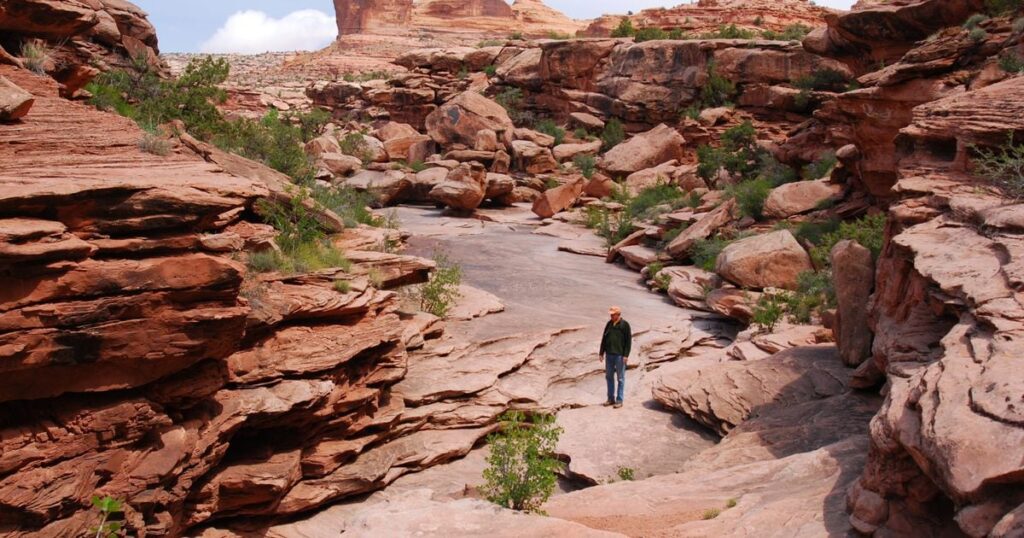Pros: Draft management plan for off-roading and Bears Ears near Moab Limits. Bad example: Utah abandons land swap with Bears Ears.
(Ray Bloxham | Southern Utah Conservation Alliance) Goldbar Canyon outside Moab will be closed to motor vehicle access by Grand County officials based on travel plans the BLM is developing for the Labyrinth Rim/Gemini Bridge area It's one of the places I'm hoping to visit and one of 11 travel plans currently in progress. For public lands in Utah.
Many states have famous ones. California has Hollywood. Michigan has an auto industry. New York has Broadway and Wall Street. Kansas has a lot of wheat.
If politicians in any of these states denigrate or oppose local signature features, they likely won't have much hope of winning an election.
Utah has public lands. Vast open spaces preserved to varying degrees as niche places of beauty, peace, recreational possibilities, cultural heritage and natural balance. A lot of money can be made by showing this territory to visitors, feeding them and renting out rooms.
Recently, several important steps have been taken to better manage these lands for current and future generations. There were also some worrying setbacks.
Sadly, and predictably, it was not the local political class that led these gains. Instead, Utah's Republican supermajority has done everything in its power to thwart such efforts in Congress and the executive branch.
It's like the governor of Florida picking a fight with Disney World.
In return, the federal government and conservationists, especially the five Bears Ears Intertribal Confederacy Indian Nations, owe Utah's jewels a debt of gratitude.
Off-road vehicle restrictions protect valuable land near Moab
The Bureau of Land Management recently established new rules for where off-road vehicles can and cannot drive on vast federal land near the resort town of Moab.
Some who love nothing more than breaking the silence of these increasingly precious lands are crying out injustice and calling on Utah to take up their cause.
But the BLM has struck a reasonable balance, allowing internal combustion engine noise to continue on more than 800 miles of roads within 300,000 acres called the Labyrinth Rim/Gemini Bridge Travel Management Area; Disturbers are prohibited from approximately 317 miles. .
(Screenshot) Bureau of Land Management map of the Labyrinth Rim Gemini Bridge Travel Management Plan on September 25, 2023.
As the social media meme goes, “When you're used to privilege, equality feels like oppression.”
Trail riders have no inherent right to blow smoke down any trail they want. And the fact that the number of open road miles still far exceeds the number of closed road miles suggests that they are not the victims here.
Despite state governments having a habit of filing lawsuits and passing blatantly unconstitutional laws that spit on the United States' inherent authority to manage the lands it owns, this new BLM ruling It should engender respect for the process.
New Bears Ears rules recognize role of tribal nations
The same process is currently unfolding as the BLM and National Forest Service submitted a management plan for the restored Bears Ears National Monument, also in southeastern Utah, for public comment.
Despite persistent protests and lawsuits from Utah politicians challenging Barack Obama's designation of the 1.3 million-acre monument in 2016, five sovereigns have inhabited the area for thousands of years. Tribal nations have designated 1.3 million acres of long-sought monuments, and preserving these ancestral lands is the right thing to do. to do.
Even better, the recently released draft plan marks the first time the federal government has begun co-managing such territory with indigenous peoples. I can't wait.
Donald Trump reduced the size of monuments by 85%. Joe Biden rightly put it back together.
By law, five alternatives for managing the area are open for public comment until June 11th. There will also be a series of public meetings, two of which will be held on Zoom, to give people a chance to hear the plans. And express your opinion. Just like you.
There is still much to consider, but concerns that the entire monument will somehow be closed to off-road recreation, grazing, or other extractive economic uses are unwarranted.
Utah backs out of land swap deal to anger Uncle Sam
Also unjustified is Utah's decision to withdraw from an agreement that exchanged 162,500 acres of federal land within the Bears Ears boundary for 167,500 acres of federal land elsewhere in the state. It's decided.
The exchange was unanimously approved by the Legislative Management Committee last June. Governor Spencer Cox signed a preliminary agreement with the Department of the Interior. With that document in hand, Representative John Curtis and Senator Mike Lee began the process of getting Congress to ratify the deal.
If Congress had acted sooner, the state would have acquired land that is less ecologically and culturally sensitive and has far more potential for development, mining, and drilling. At the time, state officials were all enthusiastic about the benefits of the deal, calling it a “crown trove” for state agencies that manage such land for the benefit of public education.
(Rick Egan | Salt Lake Tribune) A view of Monument Valley with Bears Ears in the distance from Pine Springs in Monument Valley on Thursday, May 26, 2022.
Such exchanges are common in Utah. Previous deals involved exchanging state-owned land at Grand Staircase-Escalante National Monument and the Utah Training and Testing Range for more developable soil elsewhere.
But less than two months later, Cox, Congress, Curtis and Lee all pulled out of the deal. In this election year, there is no clear reason other than to be confident that right-wing political challengers cannot accuse them of cooperating with the federal government for everyone's mutual benefit.
It is hard to believe that a majority of voters think this is the attitude the state government should take. If not, you should say so.


